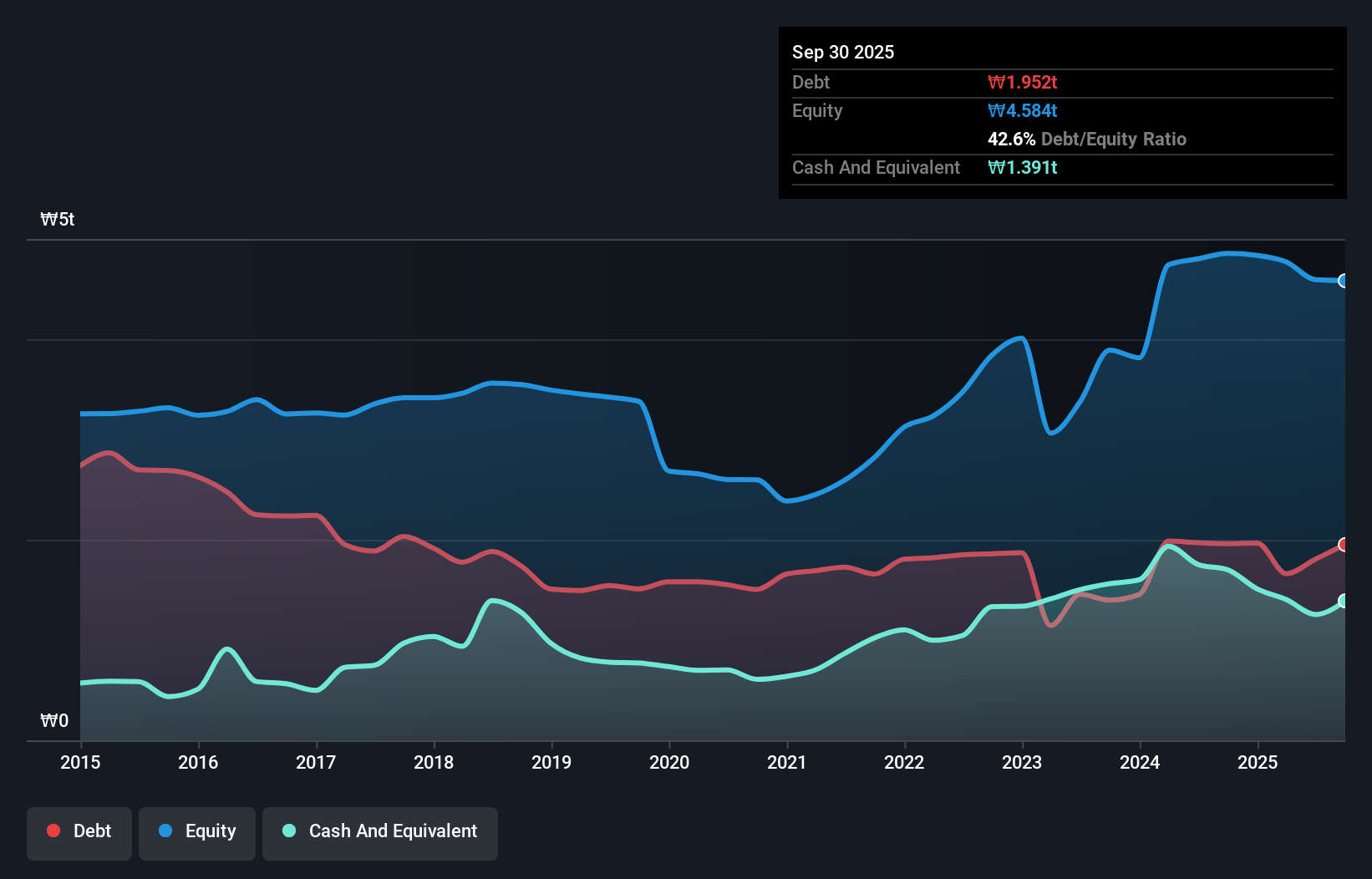Howard Marks put it nicely when he said that, rather than worrying about share price volatility, 'The possibility of permanent loss is the risk I worry about... and every practical investor I know worries about.' When we think about how risky a company is, we always like to look at its use of debt, since debt overload can lead to ruin. As with many other companies OCI Holdings Company Ltd. (KRX:010060) makes use of debt. But is this debt a concern to shareholders?
Why Does Debt Bring Risk?
Debt is a tool to help businesses grow, but if a business is incapable of paying off its lenders, then it exists at their mercy. In the worst case scenario, a company can go bankrupt if it cannot pay its creditors. While that is not too common, we often do see indebted companies permanently diluting shareholders because lenders force them to raise capital at a distressed price. By replacing dilution, though, debt can be an extremely good tool for businesses that need capital to invest in growth at high rates of return. When we examine debt levels, we first consider both cash and debt levels, together.
What Is OCI Holdings's Net Debt?
As you can see below, OCI Holdings had ₩1.95t of debt, at September 2025, which is about the same as the year before. You can click the chart for greater detail. On the flip side, it has ₩1.39t in cash leading to net debt of about ₩561.4b.

How Healthy Is OCI Holdings' Balance Sheet?
According to the last reported balance sheet, OCI Holdings had liabilities of ₩1.53t due within 12 months, and liabilities of ₩1.68t due beyond 12 months. Offsetting these obligations, it had cash of ₩1.39t as well as receivables valued at ₩400.0b due within 12 months. So its liabilities total ₩1.42t more than the combination of its cash and short-term receivables.
This is a mountain of leverage relative to its market capitalization of ₩1.91t. This suggests shareholders would be heavily diluted if the company needed to shore up its balance sheet in a hurry. There's no doubt that we learn most about debt from the balance sheet. But ultimately the future profitability of the business will decide if OCI Holdings can strengthen its balance sheet over time. So if you're focused on the future you can check out this free report showing analyst profit forecasts.
Check out our latest analysis for OCI Holdings
In the last year OCI Holdings's revenue was pretty flat, and it made a negative EBIT. While that hardly impresses, its not too bad either.
Caveat Emptor
Over the last twelve months OCI Holdings produced an earnings before interest and tax (EBIT) loss. Indeed, it lost a very considerable ₩192b at the EBIT level. Considering that alongside the liabilities mentioned above does not give us much confidence that company should be using so much debt. Quite frankly we think the balance sheet is far from match-fit, although it could be improved with time. We would feel better if it turned its trailing twelve month loss of ₩188b into a profit. So in short it's a really risky stock. When analysing debt levels, the balance sheet is the obvious place to start. But ultimately, every company can contain risks that exist outside of the balance sheet. Case in point: We've spotted 2 warning signs for OCI Holdings you should be aware of.
If you're interested in investing in businesses that can grow profits without the burden of debt, then check out this free list of growing businesses that have net cash on the balance sheet.
New: AI Stock Screener & Alerts
Our new AI Stock Screener scans the market every day to uncover opportunities.
• Dividend Powerhouses (3%+ Yield)
• Undervalued Small Caps with Insider Buying
• High growth Tech and AI Companies
Or build your own from over 50 metrics.
Have feedback on this article? Concerned about the content? Get in touch with us directly. Alternatively, email editorial-team (at) simplywallst.com.
This article by Simply Wall St is general in nature. We provide commentary based on historical data and analyst forecasts only using an unbiased methodology and our articles are not intended to be financial advice. It does not constitute a recommendation to buy or sell any stock, and does not take account of your objectives, or your financial situation. We aim to bring you long-term focused analysis driven by fundamental data. Note that our analysis may not factor in the latest price-sensitive company announcements or qualitative material. Simply Wall St has no position in any stocks mentioned.
About KOSE:A010060
OCI Holdings
Provides various chemical products and energy solutions in South Korea, the United States, China, rest of Asia, Europe, and internationally.
Very undervalued with excellent balance sheet.
Similar Companies
Market Insights
Community Narratives



